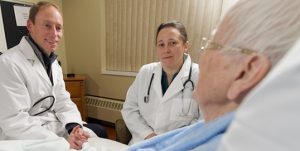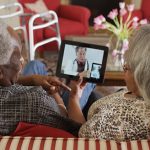In the Barczi Lab, we address two evolving needs within the field of geriatrics and aging:
Expanding the workforce of health professionals equipped to address the unique needs of older adults
 The unprecedented growth of the older adult population in recent years and the shortage of health care workers who have the training to serve this group demands creative educational strategies that are relevant and engaging for learners. These approaches need to be applicable across the continuum of trainee levels and to all interprofessional learners. Steven Barczi, MD, has spent the last 25+ years of his career as a geriatrician and clinician-educator developing new competency-based curricula, interactive learning modules and medical simulation activities that equip and assess learners’ performance in managing common geriatrics conditions (see our Resources for Learners page for more information). He has developed these programs and educational materials in collaboration with local and national colleagues, organizations and professional societies (VA, AGS, ACGME, AAIM/ASP and HRSA). He has evaluated the efficacy of these interventions and disseminated them across national networks and workgroups. All of this aims to increase the interdisciplinary workforce and train teams to proficiently manage medically and socially complex older persons while supporting their caregivers and family.
The unprecedented growth of the older adult population in recent years and the shortage of health care workers who have the training to serve this group demands creative educational strategies that are relevant and engaging for learners. These approaches need to be applicable across the continuum of trainee levels and to all interprofessional learners. Steven Barczi, MD, has spent the last 25+ years of his career as a geriatrician and clinician-educator developing new competency-based curricula, interactive learning modules and medical simulation activities that equip and assess learners’ performance in managing common geriatrics conditions (see our Resources for Learners page for more information). He has developed these programs and educational materials in collaboration with local and national colleagues, organizations and professional societies (VA, AGS, ACGME, AAIM/ASP and HRSA). He has evaluated the efficacy of these interventions and disseminated them across national networks and workgroups. All of this aims to increase the interdisciplinary workforce and train teams to proficiently manage medically and socially complex older persons while supporting their caregivers and family.
Expanding the reach of geriatrics consultation and care to underserved and/or higher risk populations using new and innovative models of care
 Consultative and primary care for older persons has historically been delivered in academic health systems and major metropolitan centers, but this means that certain populations may not have equal access to this care. Recognizing that some older patients have barriers that limit them from accessing these services in conventional settings, new models or creative adaptations to established evidence-based practices are critical for bridging these gaps and inequities. The field of geriatrics has created numerous innovative programs over the years that have helped improve patient outcomes (e.g. quality of life, ease of access, self-efficacy) and helped deliver higher value services. Barczi and his team have launched many new programs within the Madison VA and UW Health over the past 25 years including tele-geriatrics consultation, inpatient consult teams, geriatric sleep clinics, geriatric assessment clinics and home-based primary care programming. He continues to collaborate closely with content experts with research interests in dementia, palliative care, home care and others, as well as health services researchers and implementation science researchers, to effectively develop and sustain new programs that serve unique geriatric populations, primarily rural elders, homebound older persons and Native American Veterans.
Consultative and primary care for older persons has historically been delivered in academic health systems and major metropolitan centers, but this means that certain populations may not have equal access to this care. Recognizing that some older patients have barriers that limit them from accessing these services in conventional settings, new models or creative adaptations to established evidence-based practices are critical for bridging these gaps and inequities. The field of geriatrics has created numerous innovative programs over the years that have helped improve patient outcomes (e.g. quality of life, ease of access, self-efficacy) and helped deliver higher value services. Barczi and his team have launched many new programs within the Madison VA and UW Health over the past 25 years including tele-geriatrics consultation, inpatient consult teams, geriatric sleep clinics, geriatric assessment clinics and home-based primary care programming. He continues to collaborate closely with content experts with research interests in dementia, palliative care, home care and others, as well as health services researchers and implementation science researchers, to effectively develop and sustain new programs that serve unique geriatric populations, primarily rural elders, homebound older persons and Native American Veterans.
